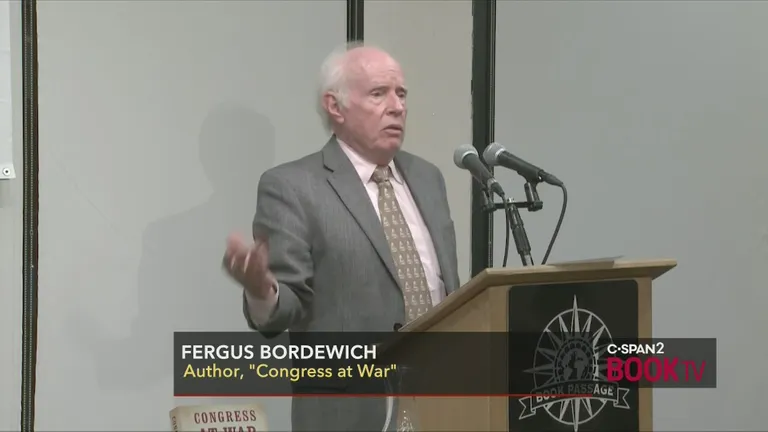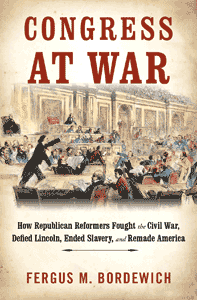Praise for CONGRESS AT WAR: How Republican Reformers Fought The Civil War, Defied Lincoln,
Ended Slavery, And Remade America
PRESS RELEASE | REVIEWS
The story of how Congress helped win the Civil War–a new perspective that puts the House and Senate, rather than Lincoln, at the center of the conflict. This brilliantly argued new perspective on the Civil War overturns the popular conception that Abraham Lincoln single-handedly led the Union to victory and gives us a vivid account of the essential role Congress played in winning the war.
Building a riveting narrative around four influential members of Congress–Thaddeus Stevens, Pitt Fessenden, Ben Wade, and the pro-slavery Clement Vallandigham–Fergus Bordewich shows us how a newly empowered Republican party shaped one of the most dynamic and consequential periods in American history. From reinventing the nation’s financial system to pushing President Lincoln to emancipate the slaves to the planning for Reconstruction, Congress undertook drastic measures to defeat the Confederacy, in the process laying the foundation for a strong central government that came fully into being in the twentieth century. Brimming with drama and outsized characters, Congress at War is also one of the most original books about the Civil War to appear in years and will change the way we understand the conflict.
READ EXCERPTS: Ben Wade at Bull Run | Power Grab: 'Sunset' Cox and the Etheridge Conspiracy of 1863
[video] FERGUS speaking with the SF Commonwealth Club
Join us for a virtual conversation with Fergus Bordewich, whose new account of the Civil War does not focus on President Lincoln's role, but instead shows how four Republican congressional leaders often led the way, pushing Lincoln to do more and even defying him at times.
[audio] FERGUS speaking with Heartland’s Tim Benson
Heartland’s Tim Benson and Fergus talk about the productivity of the 37th and 38th Congresses, two of the most impactful in American history, which were being steered by a Republican Party still in its infancy. Also how members of Congress Thaddeus Stevens, Ben Wade, and William Pitt Fessenden clashed with Abraham Lincoln over war policy, and how others like Clement Vallandigham possibly crossed the line into treasonous conduct.
[video] FERGUS speaking with KQED Forum, San Francisco
Bordewich joins Forum to discuss the challenge of governing a divided nation and how the 36th United States Congress helped hold the union together.

[video] FERGUS speaking at Book Passage in Corte Madera, CA
Historian Fergus Bordewich argues that Congress, led by the Republican Party, played a vital role in the Union's victory in the Civil War.
FERGUS TALKS WITH THADDEUS STEVENS SOCIETY on CONGRESS AT WAR:
“The political history of the war as it is generally written overemphasizes Abraham Lincoln as a seemingly independent actor at the expense of Congress, which frequently wrestled with the president over war policy, authored much significant wartime legislation, and on racial policy in particular was far in advance of Lincoln.”
What can the Civil War Congress teach the Congress of 2020? INTERVIEW WITH GOVTRACK INSIDER (Excerpt):
“[The pandemic] we’re dealing with now, extraordinary as it is... [will] last maybe a year. The Civil War lasted four years. It wasn’t clear by any means, until the third year of the war, that the North was going to prevail. Lincoln, as late as summer of 1864, though he would not be reelected and the war would be lost. The uncertainty of the country’s future, with this prodigious loss of life, touched virtually every single family in America. The scale of these two things is significantly different.”
INTERVIEW WITH HISTORY NEWS NETWORK (Excerpt):
“My work on Congress during the Compromise of 1850 showed me how much wonderful untapped and dramatic material there was to be found in the battles fought on the floor of Congress; I had also come to feel that congressional history had been sorely neglected for generations as historians focused on the presidency. If there is a message for our own time in my current book, it is an implicit argument for renewed respect for Congress and more broadly for the complex processes of our republican form of government.”
FERGUS interview with history.net on CONGRESS AT WAR: How Congress enacted innovative legislation that continues to affect the country in the 21st century:
“The Civil War era was one of the most dynamic periods of legislative activism in American history. Congress made the Union victory possible by raising the astronomical sums necessary to keep the war effort afloat by enacting the innovative sale of war bonds and the country’s first income tax. It also reinvented the nation’s financial system, in part through the issuing of the first national currency, and passed far-reaching legislation that was long blocked by prewar southern intransigence: in particular, western homesteading, the Transcontinental Railroad, and the establishment of land-grant colleges. By its determined support for emancipation, Congress also initiated the racial revolution that would overthrow the South’s cotton economy and eventually make citizens of nearly 4 million former slaves.”
REVIEWS: Publisher’s Weekly |
Library Journal |
Kirkus Reviews |
The New Yorker |
The Wall Street Journal |
The Atlantic |
Good Reads |
Book Marks |
Book Page |
Washington Monthly |
Blue and Gray Education |
The Civil War Roundtable
“Although the subject of the book is specific, its implications are universal... This is popular history of a high order—Bordewich has a terrific eye and ear for the details of his chosen time.”—Adam Gopnik, The New Yorker
“In his splendid Congress at War, the seasoned historian Fergus Bordewich demonstrates that congressional Radicals succeeded not only in forcefully challenging slavery but also in strengthening federal support for infrastructure, public education and financial stability. In no area was the Republican Congress more active than in dealing with slavery. Mr. Bordewich skillfully describes the continuing congressional effort to abolish the institution... He registers the drum beat of emancipation.”—The Wall Street Journal
“Bordewich contributes an entertaining, fresh perspective to our ever-evolving understanding and discussion of the Civil War. An important addition for both general readers of American history and scholars of the growing interpretations of Civil War studies.”—Library Journal
“Provocative... Bordewich is a master of the character sketch, summarizing complicated figures in a few swift phrases.”—The Atlantic
“Carefully documented… Bordewich offers a unique and colorful perspective on the Civil War, and regularly manages to make congressional minutiae entertaining. Readers seeking fresh insight into the era will be satisfied.”—Publisher’s Weekly
“Abraham Lincoln led the nation, but Congress actually directed the Civil War; this fine history describes how… A skilled storyteller… Colorful… A riveting history of the Civil War that argues convincingly that Congress got it right.”—Kirkus Reviews (starred)
“The author masterfully weaves the various legislative actions into a page-turning narrative. It is, in a word, “Damned Good”! (Okay, two words.)”—Blue & Gray Education
“Fergus Bordewich makes it unequivocally clear that the story he has to tell in his deeply researched, eloquently written, study of their work is no fairy tale. Rather, it is “a political history of how Congress fought that war.” What it is not, he warns, is “a book about politics in the abstract, but about the men who practiced it in the chambers of the wartime Capitol.” It is a challenging undertaking, readily accepted by an experienced historian whose skill is worthy of the men and events he seeks to understand and recount.”—The Civil War Roundtable
“Bordewich delves deep into the difficult day-to-day politics that drove these achievements. This recounting of a pivotal time in our history is superb and deserves a wide readership.”—Book Page
"Bordewich has no trouble establishing the unprecedented volume and scope of legislation... Congress in those days got things done. All of these developments are couched in a rapid-fire narrative that never misses a moment of personality and drama. There are scenes that could belong in a John Ford western.”—Washington Monthly
“One of the leading independent historians of the Civil War, Bordewich, author of books including The First Congress and America’s Great Debate, takes exception to the common assumption that Lincoln alone was the driving force behind the outcome of the War Between the States. Focusing on Congress, and in particular four influential members—Thaddeus Stevens, Pitt Fessenden, Ben Wade, and Clement Vallandigham—Bordewich tells the overlooked story of a dynamic legislature, one which, in addition to pushing the president to act on emancipation before he was ready to, created the forerunner of the IRS, laid the ground for the Federal Reserve, enacted the Homestead Act, passed the Pacific Railway Act, and created the Land Grant Colleges Act.”—Politics and Prose
“Accounts of the Civil War almost invariably put President Lincoln at the center. But Fergus Bordewich shows how four Republican congressional leaders often led the way, pushing Lincoln to do more and even defying him at times. Thaddeus Stevens, Pitt Fessenden, Ben Wade, and the proslavery Clement Vallandigham, all members of the newly empowered Republican party, passed the drastic measures to defeat the Confederacy; planned Reconstruction; created the forerunner of the Internal Revenue Service; laid the foundation for the Federal Reserve System; passed the Pacific Railway Act to link the heartland with California; created the Land-Grant Colleges Act, which laid the groundwork for public state university systems nationwide; demanded emancipation of the slaves before Lincoln was ready to consider it and in the process laid the foundation for a strong central government. Congress at War is a timely reconsideration of the conflicts of power between the White House and Congress that will change the way we understand both the Civil War and our own future.”—The Commonwealth Club
“This brilliantly argued new perspective on the Civil War overturns the popular conception that Abraham Lincoln single-handedly led the Union to victory. From reinventing the nation’s financial system to pushing President Lincoln to emancipate the slaves to the planning for Reconstruction, Congress undertook drastic measures to defeat the Confederacy. Brimming with drama and outsized characters, Congress at War is one of the most original books about the Civil War to appear in years and will change the way we understand the conflict.”—Westfall Politics & History


